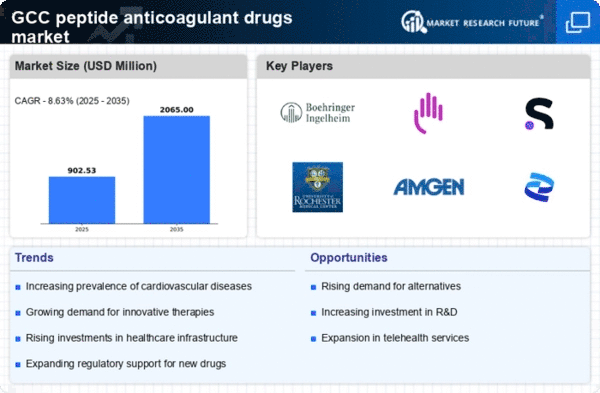Rising Geriatric Population
The growing geriatric population in the GCC is a significant driver for the peptide anticoagulant-drugs market. As the elderly population expands, the prevalence of age-related health issues, including cardiovascular diseases, is expected to rise. Older adults often require specialized treatment regimens, and peptide anticoagulants are increasingly being recognized for their efficacy and safety profiles in this demographic. The demand for tailored therapies that address the unique needs of geriatric patients is likely to propel the growth of the peptide anticoagulant-drugs market. Additionally, healthcare systems are adapting to provide better care for this population, which may further enhance the uptake of these innovative therapies.
Supportive Regulatory Environment
A supportive regulatory environment in the GCC is fostering growth in the peptide anticoagulant-drugs market. Regulatory agencies are increasingly recognizing the importance of innovative therapies and are streamlining approval processes for new drugs. This trend is particularly beneficial for peptide-based anticoagulants, which often require rigorous testing and validation. The expedited review processes and favorable policies are encouraging pharmaceutical companies to invest in research and development of these therapies. As a result, the peptide anticoagulant-drugs market is likely to see an influx of new products, enhancing treatment options available to healthcare providers and patients alike. This regulatory support may also lead to increased competition, further driving innovation in the market.
Growing Awareness of Preventive Healthcare
The increasing awareness of preventive healthcare among the population in the GCC is driving the peptide anticoagulant-drugs market. As individuals become more informed about the risks associated with cardiovascular diseases, there is a noticeable shift towards preventive measures, including the use of anticoagulant therapies. Public health campaigns and educational initiatives are playing a crucial role in promoting the benefits of early intervention and management of risk factors. This heightened awareness is likely to lead to an increase in prescriptions for peptide anticoagulants, as healthcare providers recommend these therapies for at-risk patients. Consequently, the peptide anticoagulant-drugs market is poised for growth, as more individuals seek to mitigate their health risks through effective treatment options.
Technological Advancements in Drug Development
Technological innovations in drug development are significantly influencing the peptide anticoagulant-drugs market. The advent of advanced biotechnological methods, such as recombinant DNA technology and high-throughput screening, has streamlined the process of discovering and producing peptide-based drugs. These advancements enable pharmaceutical companies to develop more effective and safer anticoagulants, catering to the specific needs of patients in the GCC region. Furthermore, the integration of artificial intelligence in drug design is likely to enhance the efficiency of research and development processes. As a result, the peptide anticoagulant-drugs market is expected to witness a surge in new product launches, driven by these technological breakthroughs, which could potentially reshape treatment paradigms in the region.
Increasing Prevalence of Cardiovascular Diseases
The rising incidence of cardiovascular diseases in the GCC region is a primary driver for the peptide anticoagulant-drugs market. As lifestyle-related health issues become more prevalent, the demand for effective anticoagulant therapies is expected to surge. According to recent health statistics, cardiovascular diseases account for a significant portion of mortality in the region, prompting healthcare providers to seek advanced treatment options. Peptide anticoagulants, known for their targeted action and reduced side effects, are gaining traction among healthcare professionals. This trend indicates a shift towards more specialized therapies, which could potentially enhance patient outcomes and reduce healthcare costs. The peptide anticoagulant-drugs market is likely to benefit from this growing need, as healthcare systems adapt to manage the increasing burden of cardiovascular conditions.
















